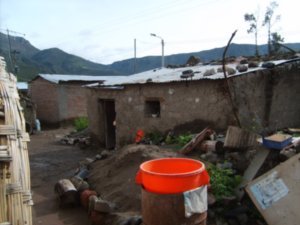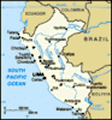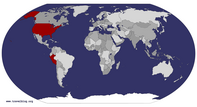Advertisement
Published: March 15th 2009

 My home in Yanque
My home in Yanque
Shot taken from my room's doorway. That is part of the courtyard and the kitchenMy first impression of Yanque was made on cold, rainy night; which mirrored the nights to come. My father, Abel, had come to greet me in Chivay and took the bus with me to my new home for the week. We reached our stop and he led me through a tin plated gate into a small courtyard. There Lucia his wife and their two daughters Evelina and Marife were waiting to meet me in the rain. We greeted each other in the traditional Peruvian way, a quick kiss on the cheek and a handshake. We had a cup of tea in their modest, adobe kitchen, the place I would spend much of my time the next week helping Lucia. We talked a little about my trip as it continued to rain on the tin roof of the kitchen, but I soon decided I was pretty tired and retired early that first night to a modest but nice guestroom. I wasn’t there long before I had a visitor in form of a toad who had hopped through the door that didn’t shut properly.
I nearly froze to death that first night not sleeping more than an hour at a time. There
was no means of heating the room and as I have said my door didn’t shut. I might as well have been sleeping outside. Morning finally came. I was told by our program director that I would be getting up around 5 every morning to go work in the fields or chakra in Quechua. This is what we have come to call a “Peruvian Truth” meaning that in all likelihood the opposite is true. In reality, I was up well before I needed to be most days since the family didn’t really get moving until about 7 or 7:30. We did, however, go to work in the chakra….once. The main source of income for my family is actually Abel’s job at the Hotel and not selling harvested goods like other families. Lucia also contributes to the family income by selling her beautiful hand made textiles.
My first day in Yanque the family took me to the hot springs nearby for the family’s weekly bathing ritual. Private showers are almost unheard of in Yanque. My family did have a flush toilet but did not have any sinks either in the bathroom/outhouse or in the kitchen. They go to the hot
springs every Wednesday to relax in the warmth of the naturally healing water and to shower-up. There are several volcanoes in the area providing the geothermal elements to create many hot spring locations and this is the bathing means for the locals. I played some games with the girls and sat and talked with my new family. We had a lovely time although I was stared at by many of the locals. I’m sure they were wondering what in the world this white girl was doing in their hot spring.
I spent that afternoon, and many other afternoons playing in the girls’ room. We had tea parties, played with Barbie dolls, and sang songs in both English and Spanish. The oldest, Evelina, is enrolled in the school in Chivay which teaches basic English. We sat for hours singing songs from a text book, first in English and then in Spanish. The girls’ favorite was “Old MacDonald had a Farm” or “Viejo MacDonald Tenía una Granja.” I would also watch TV with them on the small bunny-ear television that was in their parents’ room. Some of these Spanish shows are truly strange….
On Thursday Abel took the girls and
I to the chakra to pick corn and potatoes. Abel has three chakras in which he also grows quinoa along side the corn and potatoes. Other families also grow barley and wheat among other things. Chakras are terraced farmlands shared by many families so that while one family owns one step in the terrace, other families own the ones above and below it. In many cases families will own several steps but in different locations. That way even if one chakra is taken out by the elements, it is likely that others that were located in different locations survived. These fields are the same ones used by the Incas and even earlier cultures and Abel said that 90-95% of Yanque’s population still owns and farms at least one chakra and relies on it for at least daily food.
We picked corn or “choclo” while we ate wyro. Wyro is the name for the corn stalk which after pealing away the tough exterior reveals a deliciously sweet fiber. After picking a good amount of corn, we moved onto the potatoes. I discovered that my family thought that the United States is just one big urban area and that I had
never worked in a field or garden before. They soon realized that this was not the case as I tore up potato plants with ease and dug through the dirt to find the potatoes like a true Iowa farm girl. They were impressed. We carried back our corn, wyro, and potatoes on our backs back to the house for dinner.
That afternoon we hiked to the ruins of the original “Yanque” as the call them. These were ruins the dated to about the 1200s AD which is pre-Inca. It was nice to see something different from Inca architecture for once so I could learn about different styles. The masonry is not quite as exquisite but it is still standing after all and that says something. The Spanish ended up taking over this site in the late 1500s and turning the site that once used as a military training area into a church. There is an old cross and alter still in the old, stone building and it is incredibly eerie. We hiked around the ruins as Abel relayed the history of the area to me and Lucia pointed out all the medicinal plants she could find. We picked several

 The girls
The girls
Cruz de Condorherbs and also some leaves from a eucalyptus sapling to make tea, which is better than any cough drop. I only wish there were koalas in those eucalyptus trees…..
After returning to Yanque, we spent a good amount of time trying to recapture and heard a ewe and her lamb. Rocky, my family’s dog, decided to jump into their pasture and scare them so bad that they jumped the mud barricade and took off down the road. Abel took off after them and Rocky trying to steer them off but to no avail. We found them near the center plaza and proceeded to heard them back home, but mama would have none of it and she would take off down any side street that we were unable to block. Finally, a passerby gave us a rope to tie her up with and we dragged her back to her pasture. The lamb of course was no problem since she would follow her mother no matter where she went, although the bleating got rather annoying.
The following morning I met up with the other students that were stationed in the lowlands to take a trip to El Cruz de Condor.
This is a fantastic lookout point over the canyon in one of the deeper spots. Here we were able to watch a few condors soar freely through the air. Since it is the rainy season, the majority of the condors have migrated to the coast but the very young and they very old stay in the canyon year round. Fun Fact: Condors can live to be 70+ years. We saw three or four different condors and they flew so close to us that we could easily make out the details of their feathers and hear them winging. Condors are a very important part of this country’s identity and they are still considered sacred so it was amazing to see them up close and in their natural habitat.
That afternoon my family dressed me up in some of their traditional clothing and paraded me around for pictures. My little sister Evelina also put on her traditional outfit, so we were quite the pair. The entire outfit (2 skirts, a sash, blouse, vest, and hat) is hand embroidered. It takes weeks to complete a full outfit and they are very expensive. After we paraded around the village square, we went back
to our casa for dance lessons. I was terrible. Abel and Lucia, however, had been on dance teams and won many contests in their younger days. The still dance at annual festivals.
Early the next morning I woke up terribly sick. My family says that it was the barely soup we had the night before. Apparently if you eat corn, barley, or drink milk before going to bed and then are cold during the night, you get a very upset stomach. Not sure if I believe this but I was freezing during the night and no one else got sick. It was unfortunate because we had made grandiose plans for fishing in the Colca River and having a fish fry that day. Abel had already left by 4 am that morning to fish so there really wasn’t any way to not go since he was waiting for us by the river. I managed to pull myself together and walk the mile or two to the chakras by the river with Lucia and the girls. Abel had caught several trout by the time we arrived and he was ready to start the fry. It was delicious but my stomach just

 Soccer Field
Soccer Field
Note the goat....hated me for it.
I must comment on the way the girls eat their fish. First of all when Lucia was gutting the fish, she discovered that a few of them were carrying eggs. The girls were elated but I couldn’t understand why. Did they think they were going to have baby fish as pets? Did they not understand that these eggs would never hatch? It wasn’t until the eggs were fried up with the fish and the girls scarffed them down that I understood. Second of all, I imagine that the average little American girl would scream if an entire fish was plopped on their plate with the eyes budding out and all. Not Evelina and Marife. They were ecstatic and went right for their favorite part, the head. I watched them as they proceeded to suck out the brain and other goodies from the head cavity. It almost made me sick to watch them put the whole head in their mouths.
I laid around on the blanket most of the day trying to ignore the ache in my stomach. I did start feeling better by mid-day, however, so Abel took us down to the river to

 My family
My family
Outside my Adobe Bedroomdo some more fishing. He showed me how to cast the net and draw it back but I wasn’t able to put my skill to use because the current was too strong for me. We managed to catch several more fish that day, which we ate for the next three meals. I was feeling ok until it was time to hike the mile out of the canyon. I didn’t think I could do it in the hot sun without water and a sour stomach but once again I made it. I have learned that I can do these things even it my body refuses to cooperate.
In my last days with my family we went to the local museum, made barely flour, and went for walks. My last day in Yanque was primarily spent in local stadium where fútbol or soccer is played all day long on Sundays. We went to watch the games and also played some volleyball while we were there. The most important part of this day was an experience I had while I was buying cookies with my little sister from a cart vender. It was late in the day and so there was only one vender still open who was parked at the other side of the stadium. As Evelina and I were walking over to it, I was getting cat-called by the men sitting in the stands (I’ve gotten used to it by now.) However, as we were walking back to our seats we passed a group of girls. I could still here the men behind us but then I also heard the girls start up with some swearing and a lot of “gringa” mixed in. I told Evelina to walk faster, and the girls behind started spitting at me. That was the first time I was painfully aware of who I am and what I represent.
We had a mini-fiesta as a goodbye party complete with a bottle of Fanta and soda crackers. We danced for hours until both of the girls were asleep and we older folk were worn out. It was painful to say goodbye in the morning. They had been so wonderful to me and made me feel like one of the family. As we were walking out their front door/gate, Lucia draped a beautiful shawl around my shoulders. She had woven it herself just for me. I started to cry but tried to hold it back as best as I could. We hugged and said goodbye before I had to get on the bus and I promised I would write and hopefully visit some day in the future. But as we drove away, I couldn’t help but wonder if I would ever see them or Yanque again and what kind of a future waited for them in this changing world.
They are happy in the lives they live and even though they watch TV and see how I live in America, I don’t think they would switch places. They understand the benefits of simplicity and family is the most important possession. They may not have much but they don’t measure wealth by money and unnecessary items. This is true for most of the Peru as I have seen it. It is a completely different mindset and one that I am trying to bring home with me.
Advertisement
Tot: 0.075s; Tpl: 0.018s; cc: 6; qc: 44; dbt: 0.042s; 1; m:domysql w:travelblog (10.17.0.13); sld: 1;
; mem: 1.1mb








